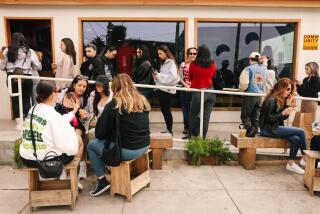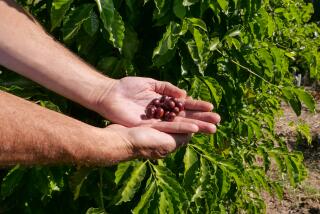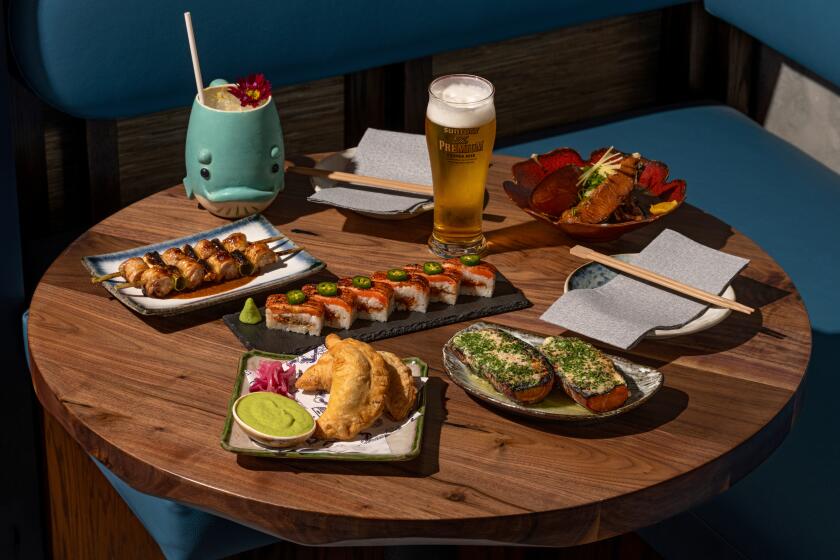At last, a brilliant brew
IN the breve new world of coffeehouses, espresso has been getting all the love. Tattooed baristas pull perfect shots from loud machines the size of Fiats. Lattes come crowned with filigreed leaves drawn in foam; macchiati appear in dainty demitasses of Italian porcelain. The drip coffee drinker, however, is handed a paper cup and directed to a stoic thermos, exiled near the napkins and sugar packets.
But a seismic change is on the way in this highly caffeinated world. Drip coffee is getting a serious upgrade, thanks to a new machine called the Clover. A high-tech gadget that looks like a cross between a water cooler and a microwave (and it’s the size of a small one), the Clover brews a single cup of coffee at a time, to order, through a process that allows the barista to adjust the brewing to fit the flavor profile of specific lots of coffee.
Coffee brewed in the Clover has the depth of flavor of a French-press brew with none of the sediment; it has a clarity and focus, even an elegance, that you just don’t experience with other brewing methods.
And the price for a cup of such brilliant coffee? Two bucks. At least that’s what it costs (for most brews) at the new downtown branch of Groundwork Coffee Co., which has the only Clover in operation so far in Los Angeles. Not bad, when you consider that the machine costs a cool $11,000.
But there are more on the way. A new coffee shop with plans to open in May in Silverlake will house two of them, and Groundwork has plans for two more. There are two in San Francisco (Ritual Coffee Roasters just installed them); ironically, Seattle has only one. There are a total of 68 Clovers in the U.S., many of them owned by coffee roasters.
Meanwhile, at the new downtown Groundwork last week, customer Ted Humphrey was excited to find the Clover -- he had heard about it, he said, and had made three trips trying to find the coffeehouse that had it. He waited as the barista, Shawna Whitlock, prepared his cup of Malacara from El Salvador.
She ground the beans in a burr grinder, poured the ground coffee into the top of the Clover, and pressed a button. About a minute later, the coffee poured into a waiting ceramic cup. Humphrey sipped -- and was impressed. “It’s a really great cup,” he said. “There’s no bitterness, but it’s not stripped down either, and it’s got terrific finish.”
Just back from a sourcing trip to Africa, where his purchases included 650 bags of raw Ethiopian beans, Groundwork President Ric Rhinehart said he sees the Clover as a way to showcase the specialty coffees -- single-origin beans, estate blends, Cup of Excellence award winners and micro-lots -- that he’s sourced and roasted to exact specifications.
“It’s a remarkable machine,” he said, “the closest approximation to the cupping ritual.” Cupping is the technique used by coffee experts to evaluate the flavor profile of a coffee, in which hot water is poured into small cups of freshly ground beans; the mixture is stirred, allowed to form a crust, which is then broken and the liquid below the surface slurped and spat out.
“For people who are drip coffee drinkers, the Clover can deliver the experience [of coffee] I have in my mind,” said Rhinehart, who has two more Clovers on order, one for his shop in Hollywood, the other for his flagship store in Venice.
But Groundwork won’t have the market cornered for long. Intelligentsia Coffee, which is soon to open its first retail store outside of Chicago in Silverlake, will have two Clovers at the new shop at Sunset Junction when the doors open in May.
Doug Zell, Intelligentsia’s founder and owner, in town recently checking on his new local roasting facility, said that not only did he have two Clovers ready for the new store, but that he wants the brewed coffee to be “all Clover.” No thermoses of coffee in sight -- or on site. All the brewed coffee the Intelligentsia store will offer -- organic Nicaraguan micro-lots, direct trade beans from Colombia -- will be made to order on one of the two machines.
Zell admitted this won’t be easy. Brewing coffee on a cup-by-cup basis takes time and attention, even on the Clover. The beans must be “dosed” (measured), ground individually to order, stirred once the water goes in -- and there’s cleanup between cups.
That leaves time for some conversation between the barista and the customer, which is one of the selling points of the Clover. The barista’s job will be to spark interest in the beans, offering an estate blend, an Ethiopian Yergecheffe just bought at auction, or a single-origin bean from a Fair Trade farm in Venezuela.
In fact, both Rhinehart and Zell use the metaphor of the wine industry when discussing their decision to use the Clover. They’d like to banish the image of the harried waitress pouring a 10-cent cup of anonymous joe. Instead the barista will be more like a sommelier, imparting specific information while changing the way the customer thinks about the very cup they’re waiting for. What it really tastes like, where it comes from, what food it pairs with. It’s the difference between ordering a glass of generic red wine or a Guigal La Mouline Cote Rotie from the northern Rhone.
So how does one machine with an $11,000 price tag achieve this?
The Clover uses a patented vacuum-press system, which essentially combines the technology of the French press and the vacuum pump.
The barista chooses a pre-programmed setting that fits the flavor profile of the coffee; she can also tweak it according to a customer’s preferences. Once the ground coffee goes in, the Clover then releases water, heated to a specific temperature, into the chamber. After the barista agitates the coffee, it steeps for an amount of time calculated by the machine -- usually 30 to 45 seconds. Then the Clover’s piston rises, creating a vacuum that draws the water through the grounds and delivers coffee to a waiting cup.
The machine, which came on the market a year ago, is the brainchild of Zander Nosler, president and co-founder of the Coffee Equipment Co., a nine-person, 3-year-old company in Seattle.
“Drip was the forgotten stepchild of the coffee industry,” said Nosler, a former mechanical engineer who worked in product development.
Sensing a need for great drip coffee in their espresso-soaked city, coffee that would show the new artisanally roasted, carefully sourced beans to their best advantage, Nosler and his co-founder Randy Hulett, also an engineer (a third co-founder has since left the company) quit their day jobs in early 2004, drafted a business plan and began development. In October 2005, the Clover debuted at the Seattle Coffee Fest.
The experiment paid off, and quickly. The Clover won the Specialty Coffee Assn. of America’s best new product award in 2006. And since it hit the market, it’s sold 80 machines worldwide. Go to the website (cloverequipment.com) and a satellite map shows the locations of the Clovers around the world, from the four just installed in Portland’s new Stumptown location, to the cafe in Vancouver, British Columbia, where the first Clover debuted, to the machine newly placed “at origin,” in Addis Ababa, Ethiopia.
This is happy news for drip coffee lovers. And it should be a boon to artisan coffee roasters, who have spent much of the last decade sourcing beans, developing relationships with coffee farmers, championing free-trade business models and fine-tuning roasting techniques.
But they’re not all convinced. Though the Clover has passionate advocates among some of the best artisan roasters in the country, others confessed to being skeptical of the high price and gadgety feel of the machine.
“It remains to be seen whether it can find a place outside the lunatic fringe,” said Tim Castle, former president of the Specialty Coffee Assn. of America and co-author of “The Great Coffee Book.”
“But it may not need to,” Castle continued. “Just being there it might be enough to stimulate interest in brewed coffee.”
*
More to Read
Eat your way across L.A.
Get our weekly Tasting Notes newsletter for reviews, news and more.
You may occasionally receive promotional content from the Los Angeles Times.







